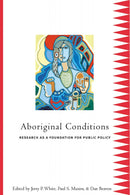Description
The contributors of Aboriginal Conditions: Research as a Foundation for Public Policy have put forth a comprehensive review of Aboriginal conditions in Canada, and the role limited and isolated research initiatives have played in the perpetuation of such conditions. This work is aimed at three primary constituencies - social scientists, policy makers and Aboriginal communities - and using recent research findings, argues for greater cooperation among these groups. Such collaboration will result in more accurate and reflective research, thus resulting in more appropriate initiatives for Aboriginal people in Canada, and eventually, positive social development within Aboriginal communities. The contributors argue that the first step toward achieving this positive social development is discussing and sharing research agendas, facilitating data access and assisting in analysis through mutual critique and review. This book is divided into four parts: the first presents a theoretical model that places communities at the center of scientific inquiry; the second shows how our understanding of who is Aboriginal, and how we define First Nations peoples, is fragile; the third demonstrates how this fragility affects policy making; and the final section looks at issues of Aboriginal development, inequality and community capacity. Notably, the final section of this work explains Aboriginal inequality with reference to the United Nations Human Development Index while also exploring intra-Aboriginal inequality. Also of interest is the examination of the impact of Aboriginal languages, and the erosion of these languages, on socio-economic conditions. This work also examines the impact of the Royal Commission on Aboriginal Peoples (RCAP), the impact of the 1985 amendments to the Indian Act, particularly Bill C-31 and the implications of the 1996 census data. Contributors to this work include: Dan Beavon, Director of Strategic Research and Analysis Directorate at Indian and Northern Affairs Canada, author and co-organizer of the 2002 Aboriginal Policy Research Conference; Paul Maxim, professor of sociology at the University of Western Ontario and author; Jerry P. White, chair of the University of Western Ontario's Sociology Department and former Deputy Chair of the Health Professions Regulatory Advisory Council of Ontario, as well as Martin Cooke, Mary Jane Norris, Karen MacCon, Erin O'Sullivan, Stewart Chatworthy, Eric Guimond, and Don Kerr. This work contains innumerable explanatory charts and tables and will be of interest to academics in areas of sociology, development, policy research and Native studies, as well as social scientists and policy makers.


